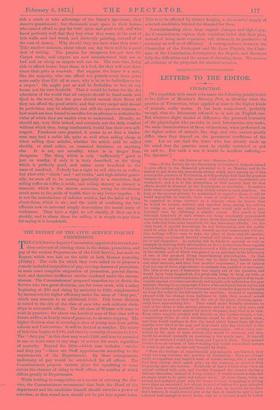THE REPORT OF THE CIVIL SERVICE INQUIRY COMMISSION.
MHE Civil Service Inquiry Commission, appointed to try and pro-
duce order out of existing chaos in the duties, promotion, and pay of the various Departments of the Civil Service, has made its Report, which was laid on the table of both Houses yesterday (Friday). The evils for which they were called on to propose a remedy included inequalities of pay, varying chances of promotion, in some cases complete stagnation of promotion, general discon- tent, and therefore inefficient service rendered under the circum- stances. The Commissioners' proposed remedies are to divide the Service into two great divisions, one for lower work, with a salary beginning at £80 and rising by seniority to £200, supplemented by increments for higher efficiency under the name of "duty pay," -which may amount to an additional £100. This lower division is suited to the elite of the class of men who seek ordinary clerk- ships in mercantile offices. The old class of Writers will cease to exist in practice ; for about one hundred men of that class will in future suffice, at hourly rates of payment, to do mere copying. The higher division aims at securing a class of young men from public schools and Universities. It will be limited in number. The salary of this class begins at £100, and rises by seniority of service to i400. The "duty pay" in this class may reach £200, and is to be accorded in one or more sums at any stage of service for merit, regardless of seniority. Beyond the £600—which sum includes "service I and duty pay "—there are Staff appointments according to the I requirements of the Departments. By these arrangements -uniformity of pay would be established for all offices. The Commissioners propose various plans for equalising to some extent the chances of rising to Staff offices, the number of which differs greatly in Departments.
While holding to competition as a means of entering the Ser- vice, the Commissioners recommend that both the Head of the department and the candidate himself should exercise a power of selection, so that round men should not be put into square holes. This is to be effected by always keeping a six-months' supply of selected candidates beyond the demand for them.
Notwithstanding these large organic changes and higher pay, the Commissioners express their confident belief that their plan, instead of being more expensive, will ultimately be productive of economy as well as of efficiency. A correspondence between the Chancellor of the Exchequer and Mr. Lyon Playfair, the Chair- man of the Commission, accompanies the Report, and discusses fully the difficulties and the means of obviating them. We reserve all criticism of the proposals for another occasion.


































 Previous page
Previous page